March 10, 2015

Bench and Bedside is a digest of the previous month’s stories about the clinical and academic activities of our physicians and scientists. We welcome your submissions and feedback.
Top news story

Hope, faith and expertise: Surgical team leads historical Mata conjoined twins surgery
Knatalye Hope and Adeline Faith Mata, conjoined twin girls born at Texas Children’s Pavilion for Women in April 2014, underwent a successful separation surgery on February 17 at Texas Children’s Hospital. Led by surgeon Dr. Darrell Cass, a team of more than 26 clinicians worked together for more than a day to separate the girls who shared a chest wall, lungs, pericardial sac, diaphragm, liver, intestines, colon and pelvis. Watch the video or read the story for a behind-the-scenes look at this monumental undertaking.
February 25
Surgical Seed Grant Award recipients named
Six researchers representing congenital heart surgery, general surgery, ophthalmology and plastic surgery were recently named the recipients of the 2015 Surgical Seed Grant Awards given by the Department of Surgery. This grant program allows surgery researchers to generate the preliminary data necessary for National Institutes of Health (NIH) grant applications and other extramural funding. In total, more than $275,000 in grants will be awarded to the following recipients:
- Ophthalmologist Dr. Lingun Kong Intravitreal Polymer Nanoparticle Drug Delivery System for Treatment of Retinopathy of Prematurity
- Congenital Heart Surgeon Dr. Carlos Mery Development of a Novel Open Fetal Cardiac Surgical Intervention for Creation of an Atrial Septal Defect in Patients with Hypoplastic left Heart Syndrome & an Intact or Highly Restrictive Atrial Septum
- Plastic Surgeon Dr. Edward Buchanan Psychometric Assessment of the Medical Interview in the Pediatric Population
- Congenital Heart Surgeon Dr. Iki Adachi Pediatric Myocardial Alterations in Response to Ventricular Assist Devices
- Ophthalmologist Dr. Mohamed Hussein Exploring the Role of the Choroid and the Autonomic Innervation in the Development of Retinopathy of Prematurity
- Pediatric General Surgeon Dr. Sanjeev Vasudevan A “Pan-Omic” Analysis of Vascular Invasion in Pediatric Solid Tumors
Read more about the Surgical Seed Grant Awards.
February 24

Luna co-leads GI study to offer hope for son, children with autism spectrum disorders
Have you ever wondered why life leads us down certain career paths? For Dr. Ruth Ann Luna, the answer is obvious – her immense curiosity and passion for research to improve the quality of life for sick children. As director of Medical Metagenomics at Texas Children’s Microbiome Center, Luna focuses much of her research on the link between disturbances in the gut microbiome – bacterial communities in the gastrointestinal (GI) tract – and GI symptoms in children. Read more
February 17
Texas Children’s expands its subspecialty, therapy services to Kingwood
Quality is key, but convenience also plays a big part in the decision-making process when parents are looking for subspecialty and therapy services. That’s why Texas Children’s works to make such services convenient to families throughout the Greater Houston area. The organization’s most recent efforts focus on Kingwood, where Texas Children’s Specialty Care at Kingwood Glen recently, and Texas Children’s Hospital Outpatient Therapy at Kingwood Glen and Texas Children’s Hospital Sports Medicine Therapy at Kingwood Glen opened in October. Read more

Multidisciplinary care enhances outcomes for women with placenta accreta
Due to our success in treating the most severe cases of morbidly adherent placenta, Texas Children’s Pavilion for Women continues to attract numerous patients from across the country. With the rise of caesarean births in the U.S., this potentially life-threatening condition is becoming more common among pregnant women. Morbidly adherent placenta – known as placenta accreta, increta or percreta, depending on the depth of uterine invasion – occurs when the placenta and its blood vessels grow deeply into the wall of the uterus and is unable to detach after childbirth. “The number of women we care for with morbidly adherent placenta is rapidly escalating as our outcomes continue to attract a growing number of referrals,” said Texas Children’s OB/GYN-in-Chief Dr. Michael Belfort, a world-renowned placenta accreta expert and founder of the Morbidly Adherent Placenta Program at Baylor College of Medicine. Read more
Texas Children’s Pediatrics opens sixth Community Cares practice
In February, Texas Children’s Pediatrics announced Texas Children’s Pediatrics Kingsland as its newest practice. Located at 21715 Kingsland Blvd., Suite 103, in Katy, Texas Children’s Pediatrics Kingsland is among six practices in the Texas Children’s Pediatrics Community Cares Program. The Community Cares Program provides trusted, high-quality pediatric medical services for children who otherwise would seek care from emergency rooms or possibly go without care or treatment due to low family incomes and/or lack of health insurance. Dr. Punita Sunder serves as the primary physician at Texas Children’s Pediatrics Kingsland. Board certified by the American Board of Pediatrics, Sunder received her undergraduate degree from Rice University and earned her medical degree from Baylor College of Medicine. She earned her doctorate in philosophy from The University of Texas Medical Branch and completed her residency at Baylor. Read more
February 10

3-D Model of Mata twins helps surgeons prepare for girls’ separation
In the months before the separation surgery of conjoined twin girls Knatalye Hope and Adeline Faith Mata, comprehensive, multidisciplinary planning was underway. With help from a Dallas printing company, Chief of Radiology Research and Cardiac Imaging Dr. Rajesh Krishnamurthy built a 3-D model of the twins’ anatomy to help surgeons plan for the girls’ separation. The model was built using a computerized image data set of the twins and a 3-D printer. The detailed model includes a detachable, transparent liver and was especially helpful in the planning of the pelvic portion of the surgery, which presented an interesting and challenging anatomical situation because each girl had her own pelvic organs but each of those organs received blood supply from the other girl. Watch the video or read the story about the 3-D model. Read more
Friends, colleagues attend Singleton tribute ceremony
Family, friends and former colleagues of the late Dr. Edward B. Singleton, Chief Emeritus of the Edward B. Singleton Department of Pediatric Radiology, gathered to celebrate the life of the late physician and relive their favorite memories of the jovial Singleton. Browse the photo gallery to see some of the moments from this tribute ceremony. View the photo gallery.
February 9

Milewicz named chief surgical officer at Texas Children’s Hospital West Campus
In February, Texas Children’s Hospital West Campus announced Dr. Allen Milewicz as chief surgical officer. In his new role, Milewicz will be responsible for organizing Texas Children’s surgery within the community, focusing on Texas Children’s Hospital West Campus. Additionally, he will be working in conjunction with the entire Texas Children’s Department of Surgery to optimize surgical service for patients, families and referring physicians. “I look forward to expanding surgical services in the community while ensuring that each patient receives the experience, expertise and clinical outcomes for which Texas Children’s is known,” Milewicz said. Read more
February 6
Cutting Edge of Pediatrics conference draws more than 100 participants
The first “Cutting Edge of Pediatrics” conference sponsored by the Department of Surgery was held in January, providing 138 Houston-area pediatricians, family practice physicians and advanced practice providers an opportunity to learn about common pediatric surgical conditions from Texas Children’s surgeons. The surgeons and pediatric providers engaged in lively discussions of the topics, which included anesthesia, ethics, adolescent gynecology, ophthalmology, orthopedics, otolaryngology, pediatric general surgery, plastic surgery and urology. Following a welcome from Surgeon-in-Chief Dr. Charles D. Fraser, Jr., presenters included Dr. Dean Andropoulos, Dr. Jennifer Bercaw-Pratt, Dr. David Coats, Dr. Nicolette Janzen, Dr. Edward Lee, Dr. Mark Mazziotti, Dr. Julina Ongkasuwan, Dr. Scott Rosenfeld and Dr. Veeral Shah. Read more
February 3
Texas Children’s researchers push for universal newborn biliary atresia screening
Texas Children’s pediatric gastroenterologist Dr. Sanjiv Harpavat is working to ensure every newborn is screened for biliary atresia, a rare but deadly liver disease affecting 1 in 10,000 births in the U.S. It’s the number one reason for liver transplants in infants. Biliary atresia occurs when the bile duct connecting the liver to the small intestine is blocked. The buildup of bile in the liver scars the tissue so rapidly that most infants need a liver transplant to survive. “Infants with biliary atresia have more scarring after the first few months of life than a chronic alcoholic’s liver,” said Harpavat. “An important way to improve their outcomes is by detecting and treating the disease early before symptoms appear.” Read more
February 2

CRC presents research award to Dr. Carla Davis
The Clinical Research Center presented the Clinical Research Award for Fourth Quarter 2014 to Dr. Carla Davis, Pediatrics-Allergy & Immunology, Baylor College of Medicine. The award was established by the Clinical Research Center in collaboration with the Research Resources Office to recognize and honor individual contributions to protecting the best interest of the research subjects and compliance with applicable rules and regulations.
Submissions for Bench and Bedside
Bench and Bedside is produced monthly by Texas Children’s Corporate Communications team to spotlight recent news about Texas Children’s physicians and scientists. The team welcomes submissions related to speaking engagements, staff awards/recognition, research, clinical work and academic activities. Send your questions or submissions to connectnews@texaschildrens.org.



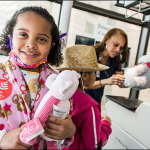

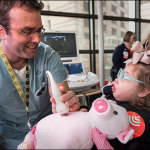
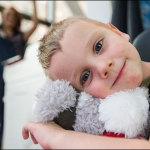
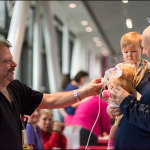

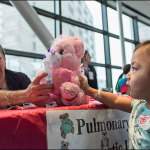
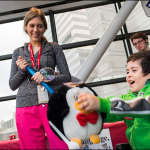


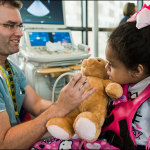
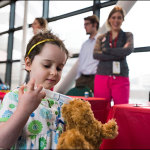










 Dr. Rohini Coorg:
Dr. Rohini Coorg: Dr. Lisa Emrick:
Dr. Lisa Emrick: Dr. Edward Espinelli:
Dr. Edward Espinelli:


